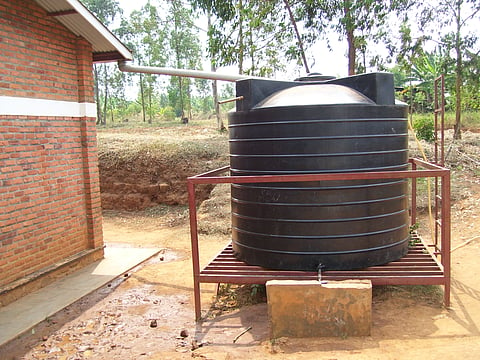

Bengaluru’s suburbs have depleting groundwater levels and the water from the Cauvery river barely reaches all the city’s residents. Yet, Bengalureans turn a blind eye towards rainwater harvesting, a survey conducted by Bengaluru Water Supply and Sewerage board reveals.
“BWSSB recently conducted a survey and it has come to our attention that around 80,000 houses have not installed a rainwater harvesting system as mandated,” a senior BWSSB official said.
In 2009, the BWSSB had issued a notification making it mandatory for all houses which are constructed on an area of 2,400 sq ft and above, to install a rainwater harvesting system. This rule also applied to old buildings.
However, the recent survey revealed that out of a total of 1.76 lakh buildings which fall under this bracket, 80,000 of them do not have rainwater harvesting systems.
“The problem is, the residents of these 80,000 odd homes and commercial buildings don’t seem to understand the importance of a rainwater harvesting system. They would rather pay fines than install it. Some of them have been paying fines for years,” the official said.
Officials say that most of these homes are located in the city’s suburbs, where the drinking water shortage is felt the most in Bengaluru. BWSSB figures show that the city is wasting around 23 TMC of water every year.
“The suburbs do not have Cauvery water connection and the people here depend on borewell or tanker water. If they install the rainwater harvesting system, then each family can save up to 540 litres of water in two months,” the senior official added.
BWSSB officials say that despite the efforts it has put in to create awareness among the people, the response has been tepid.
The BWSSB has now started a campaign to train plumbers in every ward in installing rainwater harvesting systems.
“At least during construction of houses, they will be able to suggest to the home owners to construct rainwater harvesting systems. BWSSB is reaching out to local plumbers and training them in installing these systems. Also, our Rain Water Harvesting Theme Park in Jayanagar screens films about water conservation and carries out awareness activities. Yet, people want to pay fine and wash their hands of. During summers, they blame us for not providing water. Yes, the BWSSB has been slow in laying Cauvery water pipelines but that was because we had not received money for it. But despite imposing fines, if people don’t listen, then they too must be held responsible,” he added.
For commercial buildings, which have not installed a rainwater harvesting system, for the first six months, they will have to pay a fine, which amounts to 50% of their water bill for that period. If the harvesting system is not installed even after six months, the commercial establishments will have to pay double the amount of the water bill.
For residential buildings, 25% of the total water bill for six months is imposed as fine. Once the six-month period is crossed, the water bill will be increased by 50% of the total bill amount.
The BWSSB has also set up a helpline for people who want to learn about installing a rainwater harvesting system. Residents can call 080-26653666.